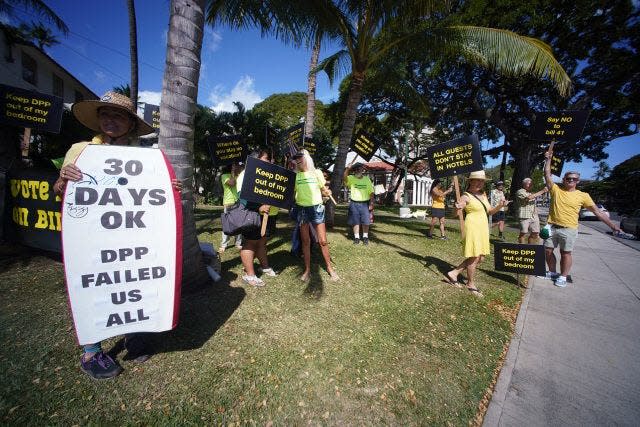A 90-day minimum on 'harmful' short-term rentals? Oahu residents speak up.
- Oops!Something went wrong.Please try again later.
A group of neighborhood and environmental organizations is seeking a seat at the table in the latest legal battle over the regulation of short-term vacation rentals in Oahu, Hawaii.
The longtime environmental group Hawaii’s Thousand Friends on Monday joined the organizations Save Oahu’s Neighborhoods, HI Good Neighbor, Keep It Kailua and Save North Shore Neighborhoods in filing a motion to intervene in a lawsuit challenging a new Honolulu ordinance meant to rein in rentals of properties in residential neighborhoods.
Honolulu’s land-use ordinance for decades has generally restricted renting properties to tourists in residential neighborhoods but also allowed rentals of 30 days or longer, regardless of whether the tenant was a tourist or someone else.
LISTEN UP, TOURISTS: Hawaii locals share what they wish visitors would stop doing
LOCAL ADVICE: You won't regret these 8 activities when you visit the islands
A new ordinance adopted this year increased the minimum stay to 90 days. In response, an organization representing property owners filed a federal lawsuit challenging the law, and last week U.S. District Court Judge Derrick Watson issued an order blocking the city from enforcing the 90-day minimum, which was supposed to take effect next week.

On Thursday, Honolulu Mayor Rick Blangiardi is expected to explain how the city plans to proceed after the court ruling. Options include settling the litigation and grandfathering in properties that had rented for at least 30 days, which the plaintiffs’ attorney has estimated to be about 1,000 properties. The city could also appeal Watson’s interim order blocking the 90-day minimum to the 9th U.S. Circuit Court of Appeals or let the lawsuit run its course and decide whether to appeal after a final ruling.
In the meantime, the activist organizations have asked Watson for permission to join the litigation as intervenors. In their request, the organizations say they are primarily homeowners in residential neighborhoods, a class of persons they say the new ordinance is meant to protect “and who will be most directly affected if the Ordinance is not allowed to take effect.”
Donna Wong, executive director of Hawaii’s Thousand Friends, did not return Honolulu Civil Beat's calls for comment on Wednesday. Christine Otto Zaa, co-founder of HI Good Neighbor, also did not return calls. Their attorney, Sharon Lovejoy, declined to comment on the substance of the motion.
The organizations did, however, issue a joint statement Wednesday outlining their position.
“For many years, we have fiercely fought to protect our residential-zoned neighborhoods from vacation rentals,” said Larry Bartley of Save Oahu’s Neighborhoods. “We believe these lodging businesses when located in residential zoning reduce residential housing supply, drive-up property values and long-term rental rates; promote tourism sprawl and resident discontent; alter the residential character and ambiance of neighborhoods and communities; compromise neighbors’ safety and security; and contradict Oahu’s General Plan.”
How would this affect transient guests?
The residents also questioned an assertion in Watson’s order enjoining the city from imposing the 90-day rule – that 30-day rentals were not just for tourists but also people like traveling nurses, military families in transition, locals who had recently bought or sold a home and folks coming to Oahu for medical care. The resident groups called these “decoys to hide that they are renting their properties as visitor lodging for tourists.”
Even renting a month at a time to transients wasn’t good for the residential integrity of neighborhoods, the groups argued.
“In our opinion, vacation rentals to transient guests in blocks of 30 days, up to 12 times per year, are equally as harmful to residential-zoned neighborhoods and residential communities as those properties that are rented weekly,” said Chuck Prentiss of Keep it Kailua.
Hawaii Legal Short-Term Rental Alliance, the group fighting the city that succeeded in getting the ordinance blocked, is run by real estate professionals in the business of renting out vacation properties. Its president, for example, is Andreea Grigore, president of Elite Pacific Properties, which offers luxury rentals that seem aimed more at wealthy visitors than ordinary people who need a place to stay for a few weeks.
One of the less expensive properties listed on Oahu, according to a recent search, was a three-bedroom home known as the Diamond Head Surf House “starting at” $585 a night. But the quote for a 30-day rental in November was more than $65,000, not including taxes and fees.
Lovejoy said this raised questions about whether the plaintiffs really were serving people like medical and military personnel in need of temporary digs.
“It appears that this plaintiff organization is led by entities in the business of vacation rentals at nightly rates that far exceed what local residents, traveling nurses and military families in transition can pay.”
Grigiore and the alliance’s attorney, Gregory Kugle, did not return calls for this story.
This story was published in partnership with Honolulu Civil Beat, a nonprofit newsroom doing investigative and watchdog journalism relating to the state of Hawaii.
This article originally appeared on USA TODAY: Short-term rentals in Oahu: Residents advocate for 90-day minimum ban

